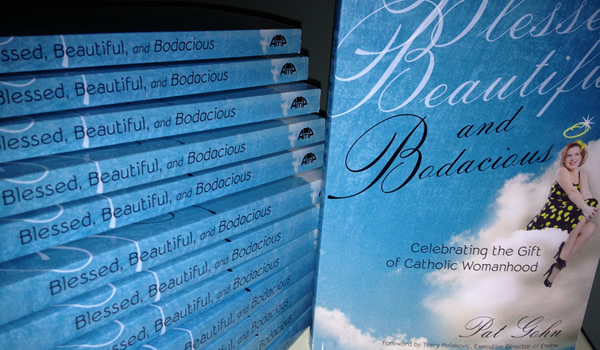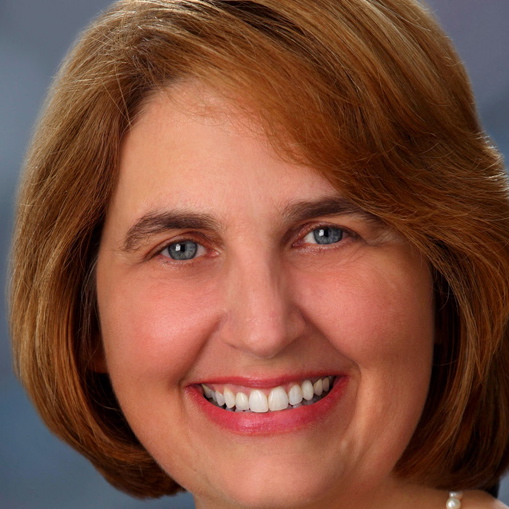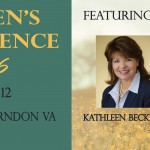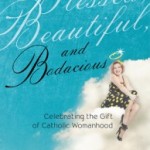Earlier this year, I interviewed Pat Gohn, wife, mother, and catechist, and author of Blessed, Beautiful and Bodacious: Celebrating the Gift of Catholic Womanhood, for National Review Online. There was much to talk about. And now, perhaps as you are looking for one last (or first!) Christmas gift — or sitting down to reflect on the past, present, and future — listen in on an extended conversation with Pat Gohn about women in the Church, women in the world, which perhaps provides insights into women in your life or the liberation of your own heart.
(This past year, Gohn participated in a Catholic Voices USA communications weekend in Boston I helped organize; she wrote about it here.)
KJL: Bodacious? Wee bit bold?
Pat Gohn: Why not “bodacious”? It’s a word that means “most excellent” and “remarkable.” It cuts through the noise and catches people’s attention. In this book I describe the dignity, gifts, and mission of women, and “bodacious” describes a woman’s mission.
KJL: Aren’t words like “bodacious” and “femininity” and churchy phrases like “feminine genius” just a little too pretty and dainty for 2013?
Gohn: As a writer, I’m all for pretty words when I can use them to fit the context of my work. As for “dainty”: that sounds a bit too small to me, and I think womanhood is a big subject. And the “feminine genius” phrase is only churchy in the sense that it was coined by a pope, but again, it’s a big subject that applies to all the goodness and gifts of womanhood.
KJL: How has music helped you love God?
Gohn: In the way that almost anything beautiful lifts the heart, I think music has a way of helping us transcend the moment, especially when a song or melody lifts us out of ourselves in a kind of time-standing-still way. Music helped me to wonder, and to imagine something bigger, grander than myself. I have always loved singing and playing music. It moves me and makes me come alive.
I think God gets our attention through the people and the things that we love most. Through the years, music was one of those things that God used in my life to bring me a lot of joy and a sense of celebration to daily life. Who hasn’t used music to make a commute, or a to-do list, go by more enjoyably? Or who hasn’t turned up the volume on a song that elicits emotion? Music also soothed me when times were hard, or when I couldn’t find the words for something I was going through. Today music still has that effect on me. Certain music lets me to sing my heart to God, as a form of thanksgiving, and of prayer. Some songs remind of the tough things I’ve already come through, and others give me great hope. I like to think God had my ears in mind when he inspired songwriters and artists with words and melodies that have become the soundtrack in my life.
KJL: Despite a Catholic upbringing, Mary was hard for you. Why is she important for people to really know? Is this especially so for women?
Gohn: Growing up, I did not form a strong connection to Mary. Back then she was more of a historical or Biblical character to me. I also had a hard time reconciling her first-century lifestyle with my modern one. But eventually I outgrew those ideas. Catholics talk a lot about our need for ongoing conversion, that the things we first understand about the Christian life are subject to bloom, or deepen, as we grow, like an acorn that grows into an oak tree. That is true with my life with Mary. Slowly I came to see her as a significant figure not only in the Bible, but also as a friend and mother in heaven who is a living, breathing, woman of influence in my life today.
Mary models a way of responding to God and to others that I wish to emulate. Her life integrates saying yes to the love of God and saying yes to serving others. As a woman, Mary was God’s change agent — at a strategic point in history, through her yes to God, she gave birth to Christ in the world. Not only did she raise and nurture Jesus amidst the political, economic, and cultural difficulties of her day, but also she became his first disciple. Later, she was a spiritual mother to all his disciples in the early church. That’s being a woman of influence, if you ask me. In Mary, women have a real go-to mentor and guide for all the complex problems we face daily. Plus she inspires us, so that in our own way we can be Christ-bearers, to bring the love of God to our world today.
KJL: Can she help a culture understand motherhood?
Gohn: Yes. When we think of the Christmas story, of Mary’s giving birth to the baby Jesus under less-than-ideal circumstances, we see the both the joy of motherhood and the sacrifice that it requires. We see the excitement and enthusiasm and hope for a new life that a baby brings — that one person can change the world! — And we also see the support that a mother needs both in her maternity, both in the delivery and nurturing of her child. The role of a caring husband, family, and friends made a big difference in Mary’s life, and in the birth of Jesus, and beyond.
The big picture here where motherhood is concerned, is that God delights in motherhood — so much so that he entrusts his own Son to a woman, sending Jesus to the world through the gift of a woman’s maternity.
KJL: But what is this “spouse of the Holy Spirit” business?
Gohn: That is a rather fantastic phrase that describes Mary and her unique grace-filled relationship to God. Jesus is God’s Son, and Mary is the human mother of Jesus, indicating a union between God and Mary must have taken place. The Gospel of Luke describes that the incarnation of Jesus, or the presence of the God-man in Mary’s womb, was the result of the Holy Spirit “overshadowing” Mary. That idea comes from the bible in Luke 1: 35: And the angel said to [Mary], “The Holy Spirit will come upon you,
and the power of the Most High will overshadow you; therefore the child to be born will be called holy, the Son of God.”
KJL: “A woman needs to know she is blessed, that she is a treasure, and the reasons why.” Don’t men, too? What’s so special about women?
Gohn: A good point! That quote of mine does come from a book that was written for a women’s audience in mind, and without any malice toward men. Of course, all human persons have need of knowing the sources of their goodness and blessing! This helps us live our lives to the fullest.
It’s been my experience that many women I meet cannot articulate what is true, and good, and beautiful about themselves. I’d like to change that by applying the beautiful message that the Church articulates about women today.
To begin to describe the specific feminine genius that each woman has, I start with a foundation that looks at us from the inside out. I begin with the very basics of who we are, how we are made, and the hope that we are destined for eternity. One of the important bricks in that foundation is learning to treasure our own human dignity — and that of others. A Christian perspective of this dignity comes from knowing and trusting that we come from a loving Creator who delighted in our origin, and in our design as both male and female. This means we reflect the goodness of God in our very being. Furthermore, Christians also believe in the blessing that is our Baptism, whereby we become beloved children of God. So we see human life as sacred in its origins, and then we bless human persons even more through the sacraments of the Church.
KJL: Surely this isn’t true of every woman. We’re not all Kate Middleton.
Gohn: Kate Middleton is as unique a treasure as you and I. Our human dignity is not based on one’s status or fame or power or any other narrow criteria. It is based on being created in the image of God. Every human person shares that, even if they disagree with a Christian worldview. In short, every single human life is of incalculable, inviolable, and enduring value.
KJL: How and why is it that “Too many women doubt” that they are, as you say, “blessed, beautiful, and bodacious”?
Gohn: After raising a family and living and working with women over the years, I’ve witnessed some great joys. But honestly, I’ve probably seen way more heartaches, depression, fears and anxieties, broken relationships, problems, and fill-in-the-blank pain and suffering than I’d care to mention. Any kind of suffering — physical, emotional, spiritual — can beat us down, and robs us of the knowledge of being blessed and beautiful. That is, unless our knowledge of who we are is yoked to something that is unchanging and eternal.
I think the struggles we face both as individuals and as a culture chip away at the truths of our human dignity little by little. Most of the problems that we face in this life come down to this question of the value of human dignity, and whether or not we are honoring, protecting, cherishing, and loving it in one another. Violations of our human dignity in a personal way, and in cultural and global ways, takes a toll on the psyche and well being of us all. That’s why I spend one third of the book describing the blessed dignity we have. Without accepting the blessing of our dignity as crucial and a core value in our identity, anything troubling that comes along can cause us to doubt the goodness of ourselves. Some of us need to discover our dignity because no one has ever shared these ideas with us, and some of us need to recover it, because of the erosion that our sufferings have caused.
KJL: I’ve heard Cardinal Dolan talking about how life is about babies — and Catholic bishops are often seem to be talking about marriage and babies. What does that mean for the infertile? For the unmarried?
Gohn: Human dignity as central to our understanding of ourselves, and human life is something we must celebrate, cherish, and protect. Babies help us understand that very well. For me, that’s the first take-away from the bishop’s enthusiasm for marriage and babies. The second is this: Children — babies — are the fruit borne of love between a man and a woman. In a Christian marriage, love between spouses is designed to be life-giving, and marital love finds its fulfillment in the fruit it bears, namely children, and the loving service the married couple brings to society at large.
You asked, what does this kind of talk mean for people who suffer infertility, and for the unmarried? It first inspires compassion. Nobody who desires biological children, and for whatever reason is thwarted from having them, can have an easy time dealing with that. There are some natural technologies that a Catholic couple might consider, but I think it is a particular suffering for married women and men who desire to have a family, to discover they are infertile.
I think a single person who may long for family of his or her own, but does not have a marriage partner, may feel a similar deprivation.
There is a deeper call to be heard in the midst of this. It is a call to love, to be a person who love is life-giving. That is, in spite of the heartaches, a person’s loving actions and service can bear good fruit. Many of us think that love conquers all, well; here is a test of that idea.
Infertile married couples may discern that their fruitful love will be manifest in building a family through adoption, fostering, or through loving service to the lonely, the poor, the elderly, or those similarly in need. A single person might become a mentor to children and others through volunteerism or advocacy.
These exact questions of infertility and single life demand that we ought to be looking at the gift of maternity in a broader and more universal way, rather than it being limited to nine months of gestation and months of lactation.
Maternity can and does have spiritual qualities, and this is a subject that we do not hear enough about. In the writings of Blessed John Paul II, we learn that a woman’s relationships with others, even if they may not be fruitful biologically, as in giving birth to a child, can be fruitful spiritually. Her loving ways can bear fruit of a spiritual, moral, emotional or cultural nature in the lives of other people that she loves and serves. This is what is called spiritual motherhood.
KJL: “The most excellent women, the bodacious women, are women who authentically live their dignity and gifts.” What is women’s dignity? And don’t we all have different gifts?
Gohn: Let me start with second question first. Yes we are all unique, and each of us has personal gifts that that we can name that fall into various categories — intellectual gifts, athletic gifts, creative gifts in the arts, domestic gifts, language gifts, social gifts, spiritual gifts… there’s more, but you get the point. We have unique gifts. But we women also share some universal ones, and we need to acknowledge them. I talk about these four gifts in my book: receptivity, generosity, sensitivity, and maternity.
Those four universal gifts in women can serve as a point of unity, and of respect between women. These are things that we share, qualities that give us a common bond. In a way, they level can the playing field and tone down the competition and help heal the hurts that sometimes occur between women.
My perspective is that we can achieve more good by being friends and supporting one other through acknowledging these shared gifts that we all are endowed with, than by separating ourselves along the lines of the personal gifts we may or may not share. In fact if we are living the gifts of receptivity, generosity, sensitivity and maternity in a dynamic way, we will come to love the truly unique gifts we see in other woman all the more. And that, you might say, helps to further answer the first question of a woman’s dignity.
When we truly understand our own human dignity, we can begin to understand that of another. In terms of promoting an better understanding between women, when we understand the preciousness of human dignity, coupled with the four gifts of her femininity, we begin to see the other woman the way that God intends us to see her — as someone truly unique and wonderfully endowed by our Creator with a precious dignity that is at once all her own, and one that combines the best of her personal gifts with the ones we share.
KJL: What exactly is “the sanctuary of my heart”?
Gohn: In Blessed, Beautiful and Bodacious I write about how we are made of body and soul. It’s this soul part of the person that is so hard to understand and qualify at times. It involves our interior life, our intellect and our will, but also the heart, the emotions. Over the years I have been very taken by the teachings I came across from the Second Vatican Council, that have since been incorporated into the newer Catechism of the Catholic Church that was published in English in 1994. They describe the conscience of a person being the sanctuary of a person. Our conscience is calling us to love and do what is good and avoid evil. It is a place in the heart where God inscribes his law… and it is our most secret core and sanctuary. There we are alone with God whose voice echoes in our depths.
When I understand ourselves being described in this way, I get a renew appreciation for the dignity of the human person, and the sacredness of our lives. It also brings to my mind a special awareness to how conscience-related issues in our society today demand special care and attention.
KJL: What’s blessed, beautiful and “downright bodacious” about Christianity’s view of women?
Gohn: Women have a blessed dignity in that their creation was ordained by — spoken and loved into existence by God — and they are graced to be a beloved daughter of God by virtue of baptism.
Women have beautiful gifts. Sure they are beautiful just by reason of their precious dignity alone, but they also have beautiful intrinsic gifts that make their womanhood a gift to God, to others, and even to themselves.
Finally women have a bodacious mission — that is, a most excellent and remarkable mission — beyond their being blessed and beautiful. Women bring life and love to the world. Humanity is entrusted to women in a particular way through their maternal gift, and this calls them to defend the human dignity of all persons, to be guardians of life who protect and nurture it. This mission also calls women to work toward a new feminism, one that strives for equality, not sameness, while embracing the complementarity of men and women. This includes finding ways to uplift a woman’s dignity by recognizing and supporting the fullness of all of woman’s gifts.
KJL: We are blessed that we simply have been called to be.” With 12 year olds having sex, that seems hard to fathom.
Gohn: Trouble in our world does not change the truths we ought to ponder and rely on and try to pass on. Your example shows us exactly why the mission of women is desperately needed to bring healing. Women who understand the dignity of life can offer powerful message of love and life to the world through their words and example. Those 12 year olds need to know their own precious dignity. They may not realize that harm that comes from disrespecting another person’s dignity, by using one another. Ultimately, this kind of conscience formation is something we must include in the way we parent our children.
KJL: “Regardless of family history, God loves us and willed us into being. We were no accident, for God conceived of us in love. You and I are and always have been wanted by God.” Then why do some people wind up with pretty lousy lives?
Gohn: The difficulties we face in life do not diminish the love that God has for us. Nor are our difficulties some kind of barometer that indicates our whether or not we are worthy of that kind of unconditional love.
But let’s face it, some of us do come from difficult families of origin that create lousy circumstances for us. But there’s a love of God that transcends that reality. There’s a God who wants to know us and love us in spite of our difficulties, and to assist us through them. It is the same God who created us, and the same God who invites us into a new family — God’s family — through Baptism. Through Baptism, we’re given graces and power to work through difficulties and find a new life and hope for the future.
KJL: Reflecting on the early years of your marriage and motherhood, you write: ‘As the Father loves me, so I also love you.’ I had to enter into that prayer of Jesus and make it my own.” How do you do that?
Gohn: Jesus taught his followers to pray the “Our Father” — The Lord’s Prayer — and that’s a wonderful prayer to pray daily. In it, we can pray like Jesus did, and its very effective in drawing us to the Father and growing more deeply in his love.
Building on the fruits of those prayers that I’ve prayed to our Father, a longtime help for me in my daily life and prayer has been praying the words of Jesus that are found elsewhere in the Gospel that match my circumstances. Those words from John’s gospel that you shared, “As the Father love me, so I also love you” are the words Jesus said to his friends, just before he died. Those words have power, affection, and great depth. They really speak to me about the way that Jesus experienced the love and his Father, and in turn, passed on that love to his beloved friends. For me, this is a phrase that I can make my own little prayer of the heart… one I can pray while I serve my husband and my children. It is a reminder that God loves very much, and I can, in turn, share that love with them in a daily way, even when my own love might seem too little or when I seem to be failing.
KJL: “Being a loving and faithful servant did not demean Mary; it fulfilled her.” You used to have a problem with Mary as “handmaid”? How do you know your current spin is true and not a coping mechanism or delusion?
Gohn: I confessed, in the past, to not really getting Mary, or understanding her. I also confessed that it was Jesus who suggested that Mary and I get better acquainted. So, thanks to him, I’m somewhat better at understanding her now. Much of what I’ve learned about Mary comes from what I’ve learned about Jesus. So, for me, the reason I understand Mary better is because she so beautifully imitates Jesus, in a womanly way. Her calling herself a handmaid of the Lord a sign that she was uniting her will, her plans, to embrace the better plan that God had for her. It ultimately fulfilled everything she could possible hope for.
I don’t call that spin, because I see Jesus doing the very same thing. Jesus mirrors the same kind of selfless love that Mary exhibits. That handmaid idea seems very much like the kind of attitude of mind and heart that Jesus exhibited and preached about when He calls himself a servant, a slave. Jesus is recorded as saying in Matthew 20:27-28, and Mark 10:44-45: “whoever would be great among you must be your servant, and whoever would be first among you must be your slave; even as the Son of man came not to be served but to serve, and to give his life as a ransom for many.”
The Christian is supposed to imitate Jesus. And it’s okay to imitate Mary and the other saints who lived their lives imitating Jesus too. If we are going to walk the talk of Jesus, we need to understand that this kind of serving is something we must embrace.
KJL: “All women have the gift of receptivity. You see it when people take root in women’s hearts and flourish there, you write. “Women breathe compassion into the world as they chastely whisper, ‘Come close. Let me hold you for a while.’” When we stop doing that, what happens?
Gohn: Receptivity is openness to God and others, reflecting both our dignity and design. It’s allowing another person inside our hearts, and its most beautifully characterized by saying yes to love. In the vocation of marriage and family life we see how a woman opens both her body and soul to her husband and her children. But beyond that particular vocation, receptivity is a welcoming embrace of other people that is manifest through virtues of love and kindness, and service that affirms and encourages another. Women bring connection and community and warmth to the world around them. Receptivity fosters life, and a sense of belonging. Whenever a woman stops being receptive to others, whatever the reason, there’s always negative ripple effect, both in her own heart, and in her spheres of influence, at home and wherever she may work or recreate.
KJL: Generosity’s actions and dispositions are the ways we demonstrate the largess and lavishness of God’s love in ours. What if we don’t feel a lavish love of God in our lives?
Gohn: Generosity is a curious thing. I’ve received it from people I least expect, in moments that I’m least deserving. I’ve met many women who do not consider themselves believers in God, or churchgoers, and yet, they are remarkably generous. It just seems like they bubble with goodness that they want to share with others. Even if they don’t feel the love of God in their lives, to my way of thinking, their kindness and goodness is evidence of his actions.
Then I’ve met women who are walking billboards for the idea of paying it forward. They’ve experienced many blessings, and the goodness of God, or they’ve been loved in ways they cannot even begin to express, so it leaks out, or overflows into the people around them.
I think God uses all kinds of women to manifest generosity in the world, the ones who acknowledge He is their source and supply, and those who are too busy being generous to worry about who’s getting the credit. Generosity is linked to the receptive nature of women, and it very much fuels receptivity.
KJL: Why is the relationship between Mary and Elizabeth important for women to understand?
Gohn: It reminds us that even Mary, the Mother of God, was in need of companions on her journey. The short answer is that women need women friends and allies in their faith and work. The relationship between Mary and Elizabeth was a familial one, but it was also characterized by a deep spiritual friendship and sisterhood. It demonstrated all four of the gifts this book talks about: receptivity, generosity, sensitivity, and maternity. Plus each woman recognized the gifts unique to the other. Elizabeth welcomed in Mary a young, vibrant, deeply spiritual woman into her home for three months as Mary helped prepare for the coming of Elizabeth’s newborn son, ahead of her own. In turn, the visit was very beneficial to Mary, the newly betrothed and newly pregnant woman. This was an opportunity, not only for her to serve, but to be served by Elizabeth’s qualities as a spiritual mother. Mary had the luxury of three months’ time to soak up Elizabeth’s loving mentoring and wisdom in marriage and community life.
KJL: How do women see with their hearts and not just their eyes? And where does the leave men?
Gohn: When it comes to describing a woman’s sensitivity, John Paul II taught that, “perhaps more than men, women acknowledge the person because they see people with their hearts.” Another way to describe sensitivity is that women easily discern the dignity of the human person.
Sensitivity makes women quick to sense, or detect, people needing nurture, care, or help. It also leads a woman to act to fill another person’s needs. This is the reason we find so many women in the helping professions, for they really shine in these roles that value their sensitive ways. One need only envision Blessed Teresa of Calcutta for an outstanding example of the strength of sensitivity in a woman.
So where does this leave men? I think this leaves men better off than if women were not sensitive. But let me smile and say that mentioning a strength, or a gift in a woman, is not a slam, or some kind of put down of men. Or vice versa. A woman’s sensitivity, just like her other gifts, can benefit and aid men in many ways. Even John Paul says, “perhaps more than men, women acknowledge the person…” This leaves plenty of room for men to utilize sensitivity in a manly ways. I’m married to a very sensitive man, and I’m grateful for this trait in him daily. But even he would admit his sensitivity is of a different sort. He is sensitive to my problem solving needs and temporal needs. It is more reactive to my requests than proactive or intuitive in knowing what I need before I need it, as a woman might be.
KJL: Why would anyone ever pray, “Jesus, break my heart with what breaks yours”?
Gohn: Being a sensitive woman means not only seeing what ails the world we live in, but taking steps to heal it. Mother Teresa once said that we could find Calcutta all over the world if we only had eyes to see. She’s talking about spiritual vision, not visual acuity. We may have a desire to want to change the world, but we may not know where to start, or what might be the best form of service for us. That prayer might just help align our deepest compassion with the most pressing needs before us. When we ask God to break our hearts, we’re asking him not for some kind of masochistic heart attack, we’re asking for a discerning heart to be broken open wide, so that our love gets spent on the right things, and so we don’t waste time on things that don’t matter. To love like Jesus loves means aligning our heart, and our will, with his.
















